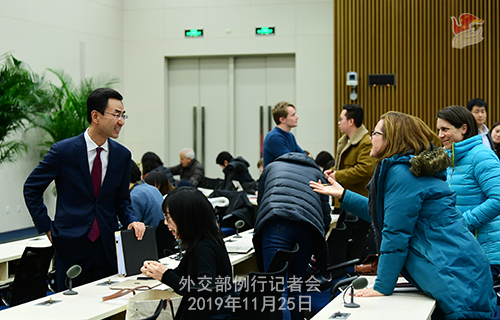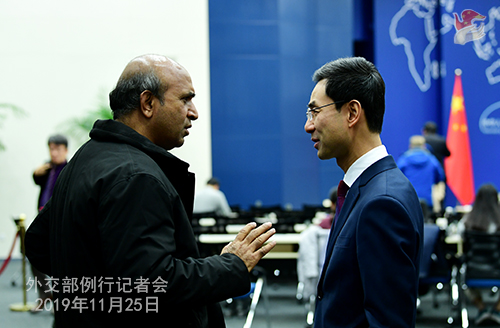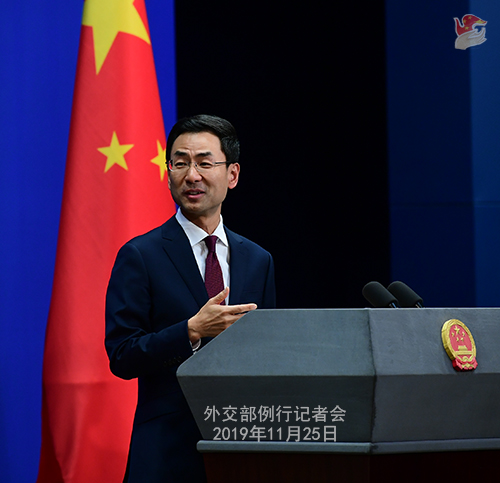| Foreign Ministry Spokesperson Geng Shuang's Regular Press Conference on November 25, 2019 |
| 2019-11-25 21:25 |
|
Q: China Institute of International Studies will hold the Middle East Security Forum in Beijing from November 27 to 28. Can you tell us more about it? Also, can you tell us how China views the current situation in the Middle East and why you choose this timing to hold this forum? A: The Middle East today is yet to be a peaceful place. With tensions in the Gulf region, rapid evolvement of hotspots and political disturbances in many countries, chaos in this region is giving a chance to the resurgence of terrorism and producing serious spillover effects. China highly values peace and security in the Middle East. In July last year, President Xi proposed more dialogue and consultation on security between China and Arab states in his speech at the opening ceremony of the Eighth Ministerial Conference of the China-Arab States Cooperation Forum. In the same ministerial conference, State Councilor and Foreign Minister Wang Yi announced China's decision to set up a Middle East security forum. The forum we are holding this time is aimed at implementing President Xi's vision. State Councilor and Foreign Minister Wang Yi will have a group meeting with special guests. Assistant Foreign Minister Chen Xiaodong will deliver a keynote speech at the opening ceremony, and our special guests will also deliver remarks. There will be almost 200 representatives attending the forum, including foreign officials and scholars in diplomatic and security fields from the Middle East and other countries, and Chinese representatives from the foreign ministry, the ministry of national defense, former diplomatic missions and think-tanks. They will discuss fairness and justice in the region, multilateralism, development for security, dialogue between civilizations and other topics. We hope this forum will provide an opportunity and a platform for exploring new thinking and new practice in the fields of security and governance in the Middle East. Q: First question, US President Trump said in a Fox news interview on Friday that he personally stopped China from sending soldiers into Hong Kong by warning this would have a negative impact on the trade deal. Is this true? Second question, how does China view the victory for "pro-democracy" candidates in the Hong Kong district elections? A: To answer your first question, I'd like to stress again that Hong Kong affairs are purely China's internal affairs that allow no foreign interference. China is determined in safeguarding national sovereignty, security and development interests. We are determined in implementing the principle of "one country, two systems" and in opposing external interference in Hong Kong affairs. Regarding China-US trade talks, our position remains consistent and clear. We hope the US will work with China to find a mutually acceptable solution based on equality and mutual respect, which will serve the interests of China, the US and beyond. To answer your second question, the most pressing task for Hong Kong at the moment is stopping violence and restoring order. As Hong Kong is part of China, its affairs are purely domestic affairs. China is determined in safeguarding national sovereignty, security and development interests. We are determined in implementing the principle of "one country, two systems" and in opposing external interference in Hong Kong affairs. Q: Russian Vice Foreign Minister Sergey Ryabkov said he will attend the consultations on arms control in Beijing on November 27. Can you confirm that? Which Chinese diplomats will be there and what will be discussed? Can you share with us your expectations for the consultations? A: As I know, China and Russia will hold bilateral consultations on strategic stability on November 27, where we will exchange views on major issues of mutual interest on arms control. We will release the updates in due course.
Q: According to reports, on November 22, the US Federal Communications Commission initially designated Huawei Technologies Company and ZTE Corp. as companies that pose a national security threat and barred American telecommunications carriers from using the Universal Service Fund (USF) to purchase equipment and services from the two companies. I wonder if you have a comment? A: We note relevant reports and the response from the Chinese company. Without any evidence, the US has been using trumped-up charges and abusing national power to oppress certain countries and businesses. It dealt Alstom a heavy blow with such maneuvering, and now it is trying to squeeze China's private companies. This kind of economic bullying is a denial of "market economy" that the US claims to champion. Were there no need for this principle to be complied with, other countries could do the same to US businesses. Prohibiting American carriers from purchasing Huawei and ZTE equipment won't help US network security. On the contrary, it will undermine network services in rural and underdeveloped areas. Relevant US departments are fully aware of that. It begs this question: whose interests are behind those policies that are meant to "protect American interests"? And what are those politicians truly after when they formulate those policies to oppress foreign companies at the expense of the interests of American businesses and citizens? Once again we urge the US to stop the pan-security trajectory, stop smears and allegations against China, stop wanton oppression against Chinese companies, and instead provide a fair, just and non-discriminatory environment for their operation in the US. A word of advice to some people in the US: if you lock all the doors to seek "security", you will only find yourself locked out of the world. Q: What's your response to Chinese citizen Wang Liqiang's claims in Australia? A: As you may have read, a statement was released by the Jing'an division of Shanghai's public security bureau on November 23. Wang Liqiang is a fugitive and has been investigated by the public security organ for suspicion of fraud. The PRC passport and Hong Kong resident document he held were both forged. This case is still under investigation as we speak. The Chinese competent authority noted the misinformation and made clarifications on this case at the earliest time possible. However, some Australian media and people are still clinging to their wrong position, quoting a person who is a criminal suspect and has zero credibility, hyping up so-called "China threat" or "Chinese espionage", and making smear campaigns that only turned out to be an unbelievably awkward farce. Our advice to those Australian media and people is to respect the truth, have some professional morals, give up ideological bias and stop doing things that are ridiculous and irresponsible.
Q: We have learned that the Beijing Public Security Bureau took action on a US non-governmental organization (NGO) called Asia Catalyst regarding its programs in China. Could you confirm this? A: You seem to be well-informed on this. According to relevant public security authorities, in March 2018, Asia Catalyst conducted activities before registration or filing record in China, therefore violating the Law on the Administration of Activities of Overseas Non-Governmental Organizations within the Territory of China. With clear facts and conclusive evidence, public security authorities in Beijing openly imposed penalties on this organization and individuals involved pursuant to the Law on the Administration of Activities of Overseas Non-Governmental Organizations within the Territory of China, Law on Administrative Penalty, and the Provisions on the Procedures for Handling Administrative Cases by Public Security Organs. I need to stress that we always welcome overseas NGOs to engage in exchange and cooperation in China. As long as they abide by Chinese laws and regulations, we are ready to facilitate their activities. At the same time, we hope personnel of overseas NGOs will not do anything illegal. Organizations that violate laws and regulations and undermine China's national security shall be handled in accordance with law. Q: The Chinese Embassy in London said the internal documents regarding Xinjiang published by media on Sunday were pure fabrication and fake news. Does the Foreign Ministry have any explanation or comment on why 17 different media outlets would publish the same so-called fake news on Xinjiang? A: I responded to questions regarding so-called "internal documents" hyped up by the New York Times last week. Let me reiterate our position that Xinjiang affairs are China's internal affairs. Certain media are trying to smear China's counter-terrorism and de-radicalization efforts in Xinjiang by despicably hyping up Xinjiang-related issues, but their attempts will not succeed. Stability, ethnic solidarity and harmony in Xinjiang is the best response to such disinformation. Q: In light of the election results, should Carrie Lam now still consider her position as the Chief Executive? A: Our position is crystal clear. The central government firmly supports the Chief Executive Carrie Lam in leading the SAR government to administer Hong Kong, supports the police in enforcing law and restoring order, and supports the judicial organs in punishing violent criminals.
Q: Speaking at the Woodrow Wilson International Center for Scholars, US Acting Assistant Secretary for the Bureau of South and Central Asian Affairs Alice Wells criticized the China-Pakistan Economic Corridor (CPEC), accusing it would only increase debt burden on Pakistan. She also said that the American mode of economic cooperation is better than China's. What's your response? A: Perhaps you noted the response from the Chinese ambassador to Pakistan made at the earliest time possible. There were also immediate refutations from Pakistan, including the Foreign Minister, the Federal Minister for Planning and Development, Speaker of the National Assembly, and Chairman of the Senate Foreign Affairs Committee. Ms. Wells' remarks are nothing new. They are a mere repetition of old slanders against China, the CPEC and the BRI like those chanted by some in the US. China and Pakistan have clarified and refuted such smears time and again. However, some in the US still use the same old script. They don't stop though the show has become a complete disaster, and they don't get off the stage even when booed by the audience. Since they are trying so hard, allow me to try and match their perseverance with the same position I stated time and again. First, in advancing CPEC development, China is committed to the principle of consultation and cooperation for shared benefits. We put Pakistani people's interests first. Major progress has been achieved in the past five years, with early harvests reaped in at least 22 projects. This has significantly improved local transportation infrastructure and power supply, created tens of thousands of jobs for Pakistanis and contributed one to two percent of economic growth in Pakistan. It shows that the CPEC is playing an increasingly important role in boosting Pakistan's socioeconomic development and improving people's livelihood. Whether the CPEC works and whether China-Pakistan cooperation is good or not, the answer is presented to you in facts and data. Second, the US side, in total disregard of facts, has been talking all about the fabricated "debt issue" with the true aim to disrupt CPEC development and sow discord in China-Pakistan relations with malicious calculations. As a matter of fact, half of Pakistan's foreign debt is from multilateral financial institutions. More than 80 percent of CPEC projects are funded by direct investment or grants from China, with less than 20 percent using Chinese loans. According to statistics released by the Pakistani side, debt incurred from the CPEC stands at 4.9 billion US dollars, less than one tenth of Pakistan's total debt. I'm afraid certain individuals in the US are not bad at math, but rather misguided by evil calculations. Third, if the US would like to conduct cooperation with Pakistan and help to accelerate its development, it should take concrete measures and honor its commitments instead of always paying lip service and being the spoiler. It is neither healthy nor honorable to prevent others from delivering what one fails to. Finally, whatever the US says or does to sabotage our cooperation, China will work with Pakistan for steady progress in the CPEC and in our all-weather strategic cooperative partnership to bring more benefits to the Pakistani people, to the region and beyond. Q: Back to the Hong Kong elections. Does the resounding result in favor of the pro-democracy camp mean China should or would reconsider how it has handled Hong Kong affairs? A: As I said earlier, the most pressing task for Hong Kong at the moment is stopping violence and restoring order. As Hong Kong is part of China, its affairs are purely domestic affairs. China is determined in safeguarding national sovereignty, security and development interests. We are determined in implementing the principle of "one country, two systems" and in opposing external interference in Hong Kong affairs. Q: Australian intelligence officials said they are investigating a plot to plant a Chinese spy in the nation's parliament. Do you have any comment? A: China doesn't interfere in other countries' internal affairs. We develop friendly cooperation with Australia and other countries based on mutual respect, equality and mutual benefit. We have not interfered and are never interested in interfering in other countries' domestic affairs. Some Australian politicians, institutions and media have been highly tense on China-related issues. They seem to have reached a state of hysteria and extreme nervousness. Stories like "Chinese espionage" or "China's infiltration in Australia", with however bizarre plots and eye-catching details, are nothing but lies. We hope those Australian politicians, institutions and media can view China and China-Australia relations with a healthy attitude, which will truly contribute to the sound and stable growth of bilateral relations as well as their own physical and mental health. Q: A recent Global Times report said China and the US are very close to the phase one deal. Can you confirm this? A: On China-US trade talks, we have been in close communication with the US side. We hope the US will work with China to find a mutually acceptable solution based on equality and mutual respect, which will serve the interests of China, the US and beyond. I'll leave the specifics to the Ministry of Commerce.
|
 |
|




